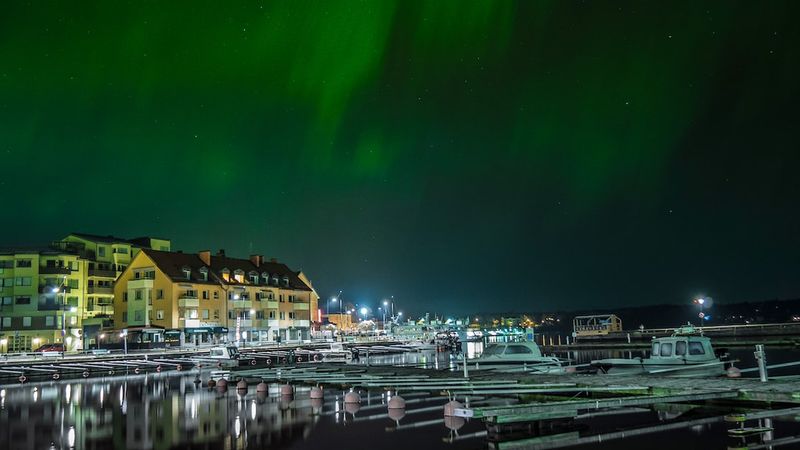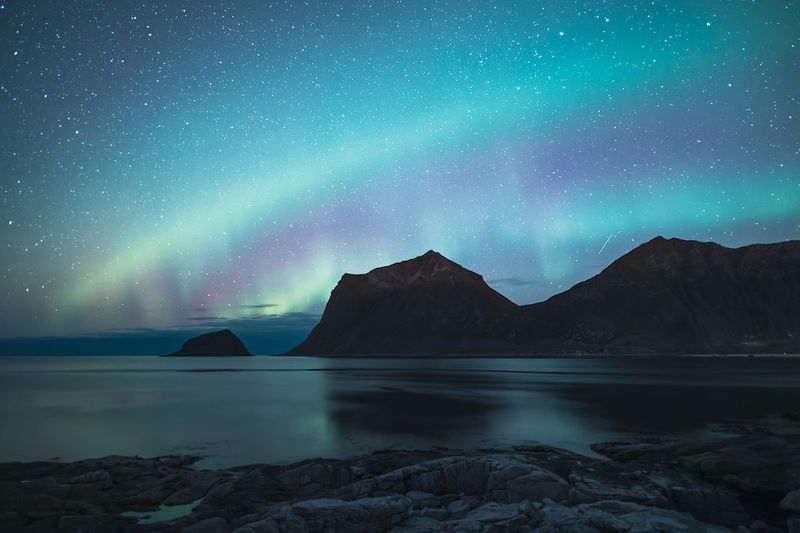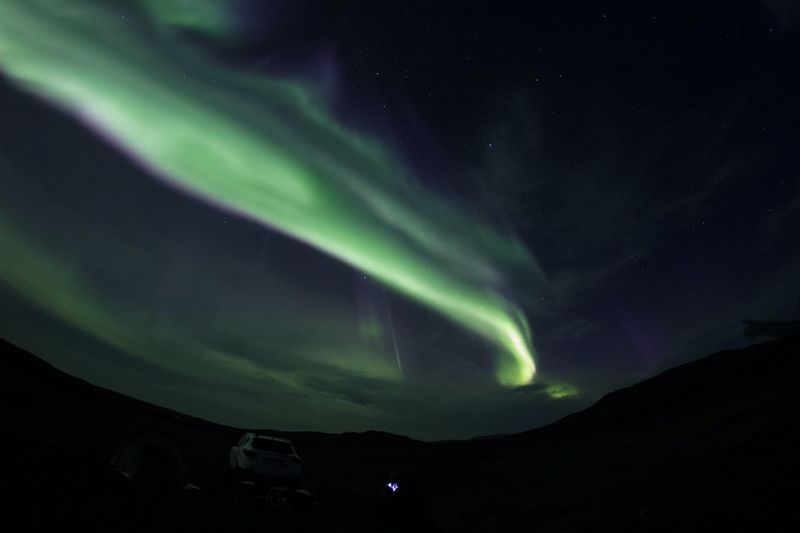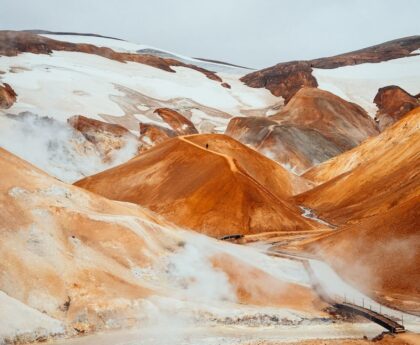The Spectacle of the Northern Lights: A Celestial Phenomenon in New York State
Introduction
The breathtaking natural phenomenon of the Northern Lights, also known as the aurora borealis, is usually associated with far-flung Arctic regions like Alaska, Canada, and Scandinavia. However, skygazers in 17 U.S. states, including New York, will have the opportunity to witness this colorful spectacle on Wednesday night and Thursday morning, thanks to an upcoming solar storm. As part of an 11-year solar cycle that will peak in 2024, solar wind will hit the Earth’s atmosphere, causing arcs and spirals of glowing lights in the night sky.
When and Where to See the Northern Lights
According to the Geophysical Institute at the University of Alaska, the Northern Lights will be visible between 10 p.m. on Wednesday, July 12, and 2 a.m. on Thursday, July 13, local time. The states where the lights are predicted to be visible are Alaska, Oregon, Washington, Idaho, Montana, Wyoming, North Dakota, South Dakota, Minnesota, Wisconsin, Michigan, New York, New Hampshire, Vermont, Indiana, Maine, and Maryland. Canada, including Vancouver, is also expected to experience auroral activity.
It is important to note that the best times to see the Northern Lights may vary based on moonlight and weather conditions, as the brightness of the moon can make it more challenging to observe the lights, and clouds could obstruct the view. As of now, the weather forecast for Wednesday night in the Syracuse area, New York, indicates partly cloudy conditions. It is advisable to check an animated forecast Wednesday morning to find the peak times for viewing in your specific area.
How to Experience the Northern Lights
The National Oceanic and Atmospheric Administration (NOAA) recommends that individuals seeking to witness the Northern Lights should find a dark viewing spot away from city lights. Simply look to the northern sky on the horizon; no special equipment or telescopes are needed. The Geophysical Institute has forecasted moderate auroral activity, with a geomagnetic index of Kp 6 (on a scale of 0-9) predicted for Thursday.
Understanding the Phenomenon
Auroras, including the Northern Lights, are created by coronal mass ejections (CME) on the sun, which result in solar winds colliding with the Earth’s upper atmosphere. This collision generates a visual spectacle of colorful lights. The unique colors displayed by the lights, such as pink, purple, red, green, and others, depend on the chemical composition of the atmosphere. Every atom or molecule has its own set of colors that it absorbs and radiates, creating a distinct visual display.
Astronomer Billy Teets from the Dyer Observatory at Vanderbilt University explains that the dominant colors seen in auroras are red, produced by nitrogen molecules, and green, produced by oxygen molecules. In essence, the Northern Lights showcase the distinctive fingerprints of atoms and molecules present in the atmosphere.
Editorial: Finding Beauty in Celestial Phenomena
The upcoming appearance of the Northern Lights in states like New York provides a timely reminder of the magnificence and grandeur of nature. This celestial spectacle, often associated with remote and pristine Arctic regions, will grace the skies of bustling and more populous areas. It presents an opportunity for individuals to connect with the wonders of the universe and to appreciate the beauty that exists beyond our daily lives.
In an era marked by technology, instant gratification, and the constant influx of information, taking a moment to witness and contemplate natural phenomena like the Northern Lights can serve as a respite for our busy minds. It reminds us of the vastness and complexity of the universe and the importance of finding solace in moments of awe and wonder. As we gaze upward in collective admiration, the Northern Lights offer a humbling reminder of the interconnectedness of all things and the profound beauty that permeates our world.
Advice for Skygazers
For those in the designated states fortunate enough to have the opportunity to witness the Northern Lights, here are a few pieces of advice:
1. Seek out dark viewing spots away from city lights: To fully appreciate the beauty and brilliance of the Northern Lights, finding a location with minimal light pollution will enhance the experience.
2. Be patient and adaptable: Weather conditions can be unpredictable, and the brightness of the moon can affect visibility. Keep an eye on the weather forecast and be prepared to adjust your plans accordingly.
3. Embrace the middle of the night: As astronomical observations have revealed, the Northern Lights are typically more visible during the middle of the night, away from the sunset and sunrise. Plan your viewing accordingly.
4. Engage with the experience: Witnessing the Northern Lights is not just about viewing them; it is about immersing yourself in the moment. Take the time to absorb the beauty of the lights, reflect on the grandeur of the universe, and find a sense of connection with the celestial realm.
In conclusion, the upcoming appearance of the Northern Lights in various U.S. states, including New York, provides an extraordinary opportunity for individuals to witness the awe-inspiring display of this natural phenomenon. As we venture into the night, away from the distractions of our daily lives, let us be still and open ourselves to the wonder and beauty that patiently awaits us in the vastness of the starlit sky.

<< photo by Axel Antas-Bergkvist >>
The image is for illustrative purposes only and does not depict the actual situation.
You might want to read !
- “Chasing the Spectacular: A Guide to Witnessing the Northern Lights Dance Across America”
- Illinois in for a Dazzling Northern Lights Show?
- A Rare Spectacle: Northern Lights May Grace Illinois and Indiana Skies
- “Keys Unlocking Victory: Madison Beats Andreeva to Advance at Wimbledon”
- The Clash of Baseball Titans: Analyzing the Chicago Cubs vs. New York Yankees Matchup
- The Best Spots to Catch the Spectacular 4th of July Fireworks Display in NYC 2023
- Fireworks Unite New York City in Spectacular Macy’s Fourth of July Show
- Exploring the Cultural Phenomenon of Barbie: A Fashionably Pink Premiere in LA
- “Chasing the Magical Aurora Borealis: A Guide to Spotting the Northern Lights Across America”
- “The Science and Significance of the 2023 Summer Solstice”
- “The Blazing Sun: Unveiling 6 Fascinating Facts about the Summer Solstice”




